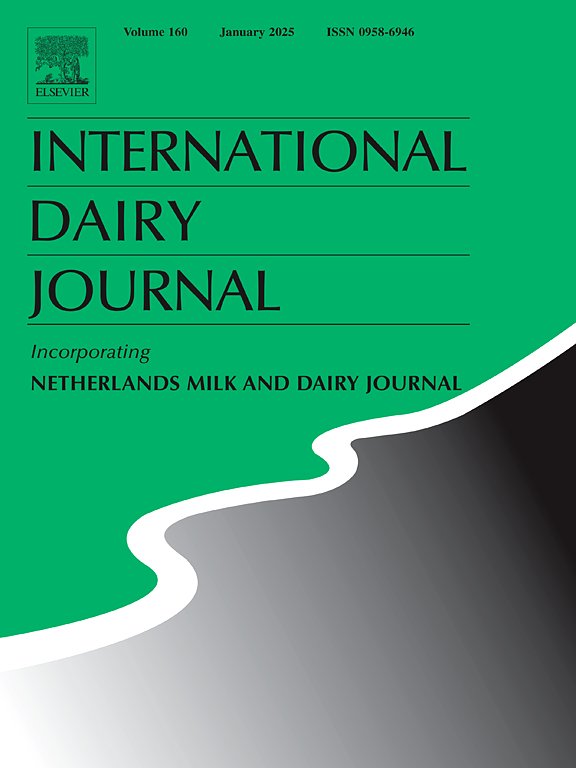乳制品的天然生物防腐剂:微生物和植物衍生的解决方案和最新进展
IF 3.1
3区 农林科学
Q2 FOOD SCIENCE & TECHNOLOGY
引用次数: 0
摘要
乳制品是人类饮食的重要组成部分,提供有价值的营养,有助于整体健康和福祉。但是,这些乳制品的易腐性质在保持其质量和延长其保质期方面提出了挑战。传统的保鲜技术,如化学添加剂和热加工,由于其影响产品的营养品质,特性和消费者的感知,具有局限性。另一方面,生物防腐剂为乳制品和乳制品的保存提供了一种自然和可持续的方法。生物防腐剂延长乳制品保质期的效率取决于多种参数,包括产品配方、加工条件和储存温度。为了获得最佳的保存结果,需要考虑不同生物防腐剂之间的相互作用及其与特定乳制品基质的相容性。利用细菌和植物提取物代谢物的不同抗菌特性,可以有效抑制腐败微生物的生长,从而保持乳制品的质量和安全。生物保鲜剂为延长乳制品的保质期提供了一个可行的解决方案。这些微生物产生细胞外酶,如蛋白酶和脂肪酶,导致异味、异味和质地变化,如凝固和凝固。人们需要更安全、更可持续的选择,比如使用生物制剂。生物防腐剂有望彻底改变乳制品行业,并为更负责任和可持续的食品供应做出贡献。随着未来研究对生物储备的理解和应用的推进,对消费者和环境的潜在好处都是显著的。本文章由计算机程序翻译,如有差异,请以英文原文为准。

Natural biopreservatives for dairy products: Microbial and plant-derived solutions and recent advancements
Dairy products are an important part of the human diet that provides valuable nutrients and contributes to overall health and well-being. But the perishable nature of these dairy products poses challenges in terms of maintaining their quality and extending their shelf life. Traditional preservation techniques like chemical additives and thermal processing have limitations because of their impact on product's nutritional quality, characteristics and consumer perception. On the other hand, bio-preservatives offer a natural and sustainable approach to dairy and dairy product preservation. The efficiency of biopreservatives in extending the shelf life of dairy products depends on a variety of parameters including product formulation, processing conditions, and storage temperature. Interactions between different biopreservatives and their compatibility with specific dairy matrices need to be considered for optimal preservation outcomes. Leveraging the different antimicrobial properties of bacteria, and metabolites from plant extracts can effectively inhibit the growth of spoilage microorganisms, thereby preserving the quality and safety of dairy products. Biopreservatives provide a viable solution to the problem of prolonging the shelf life of dairy-based products. while meeting consu These microorganisms produce extracellular enzymes such as proteases and lipases, leading to off-flavors, off-odors, and texture changes, such as coagulation and curdling.mer demands for safer and more sustainable options like utilization of biological agents. Biopreservatives are poised to revolutionize the dairy industry and contribute to a more responsible and sustainable food supply. As future research advances the understanding and applications of biopreservatives, the potential benefits for both consumers and the environment are significant.
求助全文
通过发布文献求助,成功后即可免费获取论文全文。
去求助
来源期刊

International Dairy Journal
工程技术-食品科技
CiteScore
6.50
自引率
9.70%
发文量
200
审稿时长
49 days
期刊介绍:
The International Dairy Journal publishes significant advancements in dairy science and technology in the form of research articles and critical reviews that are of relevance to the broader international dairy community. Within this scope, research on the science and technology of milk and dairy products and the nutritional and health aspects of dairy foods are included; the journal pays particular attention to applied research and its interface with the dairy industry.
The journal''s coverage includes the following, where directly applicable to dairy science and technology:
• Chemistry and physico-chemical properties of milk constituents
• Microbiology, food safety, enzymology, biotechnology
• Processing and engineering
• Emulsion science, food structure, and texture
• Raw material quality and effect on relevant products
• Flavour and off-flavour development
• Technological functionality and applications of dairy ingredients
• Sensory and consumer sciences
• Nutrition and substantiation of human health implications of milk components or dairy products
International Dairy Journal does not publish papers related to milk production, animal health and other aspects of on-farm milk production unless there is a clear relationship to dairy technology, human health or final product quality.
 求助内容:
求助内容: 应助结果提醒方式:
应助结果提醒方式:


